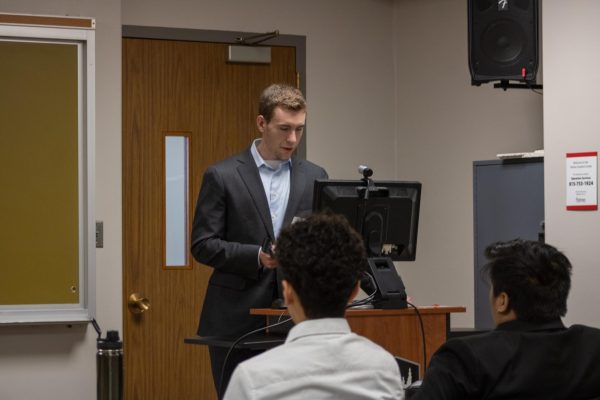Journalist, activist inspires at Holmes Student Center
February 21, 2006
Comical, serious and classy Kevin Powell, a journalist and activist, spoke Monday night in the Holmes Student Center’s Capitol Room.
He discussed a variety of topics ranging from Hurricane Katrina to his hip-hop upbringing.
While September 11, 2001 was reflected upon for years, Hurricane Katrina was only discussed for a few months, while families were separated and people were stuck on rooftops.
“It was your own government that ignored your own people,” Powell said about Hurricane Katrina.
Some shared Powell’s sentiments.
“We’re so fast to help people overseas, but [not] when something happens in our own country,” said Reggie Brown, junior corporate communication major and Phi Beta Sigma president.
Powell said with a good education, people learn to ask the question, “Why is this happening?” Powell said he thinks some students in college can be apathetic or take college for granted by not joining any organizations that can help develop leadership, organization and social skills for the real world.
Throughout the Civil Rights movement, African Americans wanted simply to be treated as citizens, have the right to vote and be able to sit on a bus or use the bathroom without fearing for their lives, Powell said.
Powell often had to shake the cockroaches off bread and eat it anyway because he was so hungry. He grew up around violence in a small house with 10 other people and often had to sleep on the floor.
“[Powell’s] come from a rough background to where he is now,” Brown said. Brown said he could relate to Powell’s speech and experienced a similar background.
Powell’s mother made sure he was sent to the best possible schools she could send him to in Jersey City so one day he would be able to be more free than she was ever able to be throughout her life.
However, even the best schools lacked in black history education.
“I learned that Martin Luther had a dream … but who was the man? Imagine if you’re Jewish … or Indian … and don’t know your history.”
For much of his speech, Powell talked about differences between actual hip-hop culture and today’s hip-hop industry.
“When I grew up it seemed a lot of my friends and peers looked up to rap artists. Young children [today] look up to the rap artists. It’s sad that they don’t know the influence of what they put out in their records and their videos,” Brown said.
Other students agreed hip-hop does not always have a positive or uplifting message.
“Hip-hop culture is not as uplifting as it should be and once was,” said senior communication major Chinwuba Okafor. “It’s limiting the horizons.”
Much of his speech also related to people knowing their roots.
“It’s an issue of defining. We should define what we created. A lot of modern stuff I don’t like to listen to because it doesn’t give a message. It’s the materialistic drive of our society,” Okafor said.
Powell closed his speech with areas he felt people could focus on while improving values.
“[He is a] powerful speaker, and his presence is way overdue,” said Tamika Romayne, senior corporate communication major.












